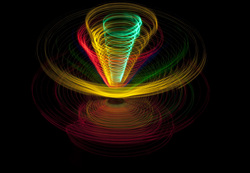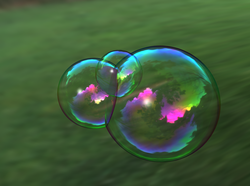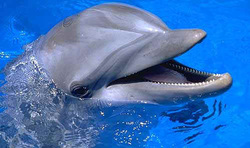Reality as Information

I am not an expert in this field, but I do know my way around programming a computer. It's unfortunately easy to fall into the trap of using one's discipline as the paradigm through which all other fields are filtered. Either epistemology will play nicely with information theory or it won't, but it's a lot easier for me to grok in terms of information theory. For your perusal, my five (and counting) fundamental epistemological assertions:
- Reality exists
- Truth, identity, and logic are in the map
- Reality is self-consistent, but not all self-consistent systems are correspondent
- Causation expresses correlation
- Knowledge requires information entanglement
Shut Up About Free Will Already!

Seriously, just shut up. I get it. I don't need to see 10% of the posts in /r/philosophy dedicated to rehashed questions of determinism and free will.
Free will is nothing more than a semantics problem. It's time to taboo words and make predictive claims. If you can't do that then you haven't actually explored the concepts that you're pushing around your head like so many chairs.
I aim to explain how free will is nothing more than a problem of identity and system opacity versus transparency. Move the boundaries and the problem (and apparent conflict) dissolves. I also want to lay to rest the bogus claim that free will is necessary for responsibility. If anything, I think a faulty conception of free will is responsible for the most wasteful criminal "justice" approaches practiced today.
Free will is nothing more than a semantics problem. It's time to taboo words and make predictive claims. If you can't do that then you haven't actually explored the concepts that you're pushing around your head like so many chairs.
I aim to explain how free will is nothing more than a problem of identity and system opacity versus transparency. Move the boundaries and the problem (and apparent conflict) dissolves. I also want to lay to rest the bogus claim that free will is necessary for responsibility. If anything, I think a faulty conception of free will is responsible for the most wasteful criminal "justice" approaches practiced today.
Subjective/Objective, Is/Ought, Good/Bad, Right/Wrong

Means and Meaning
Religion is Just Another Scam

I used to be religious. I started out as Catholic because, surprise, that's how I was raised. During my teenage "rebellious years" I broke off from Catholicism before my confirmation and started investigating the animism of some of the indigenous American tribes. That wore off fairly quickly though my spiritual side remained. I eventually moved to Florida with my mother and stepfather and they started going to a non-denominational baptist-style church.
Still, pieces of me resisted the conversion. I just couldn't let go of what I saw and of conceptions which, in the mind of an amateur musician as myself, were harmonious. I later found out that the church was scamming its members to make the leadership rich. Now, this is only one data point, but I started thinking more about blind trust and organized bureaucracies. Whether or not a higher power exists, organized religion is a scam which takes power and moral authority away from its members.
Is a sense of spirituality and meeting for fellowship and ritual useful? Sure. But those can be had in ways which are far less deleterious.
Still, pieces of me resisted the conversion. I just couldn't let go of what I saw and of conceptions which, in the mind of an amateur musician as myself, were harmonious. I later found out that the church was scamming its members to make the leadership rich. Now, this is only one data point, but I started thinking more about blind trust and organized bureaucracies. Whether or not a higher power exists, organized religion is a scam which takes power and moral authority away from its members.
Is a sense of spirituality and meeting for fellowship and ritual useful? Sure. But those can be had in ways which are far less deleterious.
Ritual and Habit are Useful

Despite my anti-religion stance, I believe that ritual and habits are useful for building a sense of shared experience that identity and shared-boat ethics can coalesce around.
Every year my friend organizes a winter solstice party where the people we grew up with, many who have scattered to the four corners of the country, come back for one night of laughing, drinking, eating, telling stories, and joking around. This connection helps us, in some small way, to grow together rather than growing apart (as the clichéd statement goes).
I believe that social cohesion requires a shared sense of identity and a shared sense of destiny. More than that, I believe that humans need to practice that which they want to be good at. Even things which seem like they are no-brainers. People cannot be optimally "good" unless they practice being good - and that practice will require habits and rituals: habits to build the neural associations between inputs and outputs, and rituals to give an emotional charge to the habits, to influence desires in a way which leads to value ownership.
Every year my friend organizes a winter solstice party where the people we grew up with, many who have scattered to the four corners of the country, come back for one night of laughing, drinking, eating, telling stories, and joking around. This connection helps us, in some small way, to grow together rather than growing apart (as the clichéd statement goes).
I believe that social cohesion requires a shared sense of identity and a shared sense of destiny. More than that, I believe that humans need to practice that which they want to be good at. Even things which seem like they are no-brainers. People cannot be optimally "good" unless they practice being good - and that practice will require habits and rituals: habits to build the neural associations between inputs and outputs, and rituals to give an emotional charge to the habits, to influence desires in a way which leads to value ownership.
Sphere of Influence, Sphere of Concern

When hunting and gathering was the primary mode of existence among humans, the degree to which one could influence another or the environment for good or ill was very small. Consequences were geographically limited and effects were immediate and directly connectable to initiating actions. The sphere of influence, direct or otherwise, of an individual human for most of human history has been quite small.
Unsurprisingly, humans have evolved to not really care about more people than could fit in a manageable tribe or things which happen too far in the future. The sphere of concern of an individual human for most of human history has also been quite small.
Interesting problems appear when these two spheres do not encompass the same consequences. Well known are the problems of creating long-term or far-reaching consequences which one doesn't care about either through ignorance or via the in-group/out-group divide. It is the more overt and apparently dire of the two possible mismatches and one which must absolutely be addressed to a moderate degree if humans are to survive in large numbers beyond this century. Less known is the problem of being overly concerned with things which one has little direct control over. In an attempt to make influence synonymous with direct influence, people become angry or depressed or, worse, cede power and moral authority to those who promise they can address the issues an individual is concerned about.
Unsurprisingly, humans have evolved to not really care about more people than could fit in a manageable tribe or things which happen too far in the future. The sphere of concern of an individual human for most of human history has also been quite small.
Interesting problems appear when these two spheres do not encompass the same consequences. Well known are the problems of creating long-term or far-reaching consequences which one doesn't care about either through ignorance or via the in-group/out-group divide. It is the more overt and apparently dire of the two possible mismatches and one which must absolutely be addressed to a moderate degree if humans are to survive in large numbers beyond this century. Less known is the problem of being overly concerned with things which one has little direct control over. In an attempt to make influence synonymous with direct influence, people become angry or depressed or, worse, cede power and moral authority to those who promise they can address the issues an individual is concerned about.
Owning your Values

If there was one thing that I wish people would adopt from this site, it's owning your values. That's not the same thing as merely recognizing what they are and that they exist - it's embracing them and living them to the fullest extent possible, taking charge of them and responsibility for them... living fiercely and honestly.
The alternative is to float through life largely on autopilot constantly being reactive to situations instead of proactive. If you merely recognize your values, you may end up constantly apologizing for them or excuse clouding - grasping at straws as to why you're justified in having them.
Owning your values is living your values unapologetically. If you have a value, don't apologize for it! If you don't like one of them, then that means you have a conflicting value somewhere and you need to let one win. You can be wrong about means, but not ends. You don't have to live apologetically; even though I'm working on shifting toward veganism, I'm not going to apologize for my desire for steak - that filet mignon tastes delicious. That's not right or wrong - it doesn't need to be justified - it just is.
The alternative is to float through life largely on autopilot constantly being reactive to situations instead of proactive. If you merely recognize your values, you may end up constantly apologizing for them or excuse clouding - grasping at straws as to why you're justified in having them.
Owning your values is living your values unapologetically. If you have a value, don't apologize for it! If you don't like one of them, then that means you have a conflicting value somewhere and you need to let one win. You can be wrong about means, but not ends. You don't have to live apologetically; even though I'm working on shifting toward veganism, I'm not going to apologize for my desire for steak - that filet mignon tastes delicious. That's not right or wrong - it doesn't need to be justified - it just is.
The Problem of Animal Rights

Here's my take on the animal rights thing - and I am trying to move to veganism, though I think I'll probably end up building an aquaponics system once I get some land - so basically fish, and I'll probably try to get some egg layers going (meat fruit).
The standard objection to animal rights is that animals don't have reason, or an inner life, or a soul, or some other missing quality. Neurologically, this is being discovered to be false, at least among many mammals and birds. Non-human animals may not have the same degree of inner life as adult humans do, but so what? Where's the threshold? If one can't convincingly give me a threshold, then they need to find another reason.
Except they don't... because I already know the reason and it has nothing to do with the inner life of conscious creatures, it requires nothing more than an examination of raw power.
The standard objection to animal rights is that animals don't have reason, or an inner life, or a soul, or some other missing quality. Neurologically, this is being discovered to be false, at least among many mammals and birds. Non-human animals may not have the same degree of inner life as adult humans do, but so what? Where's the threshold? If one can't convincingly give me a threshold, then they need to find another reason.
Except they don't... because I already know the reason and it has nothing to do with the inner life of conscious creatures, it requires nothing more than an examination of raw power.
Can a Room Have Understanding?

John Searle introduced The Chinese Room Problem to point out that "a program cannot give a computer a 'mind,' 'understanding,' or 'consciousness,' regardless of how intelligently it may make it behave." Counterexample: humans. Unless one wants to resort to dualism (which just kicks the can down the road), how do human brains have "minds," "understanding," or "consciousness?" Related: life. How does carbon, which is not alive, make something which is alive?
It seems to me that the problem fails to account for systemic emergence and fails to avoid the composition fallacy.
It seems to me that the problem fails to account for systemic emergence and fails to avoid the composition fallacy.
